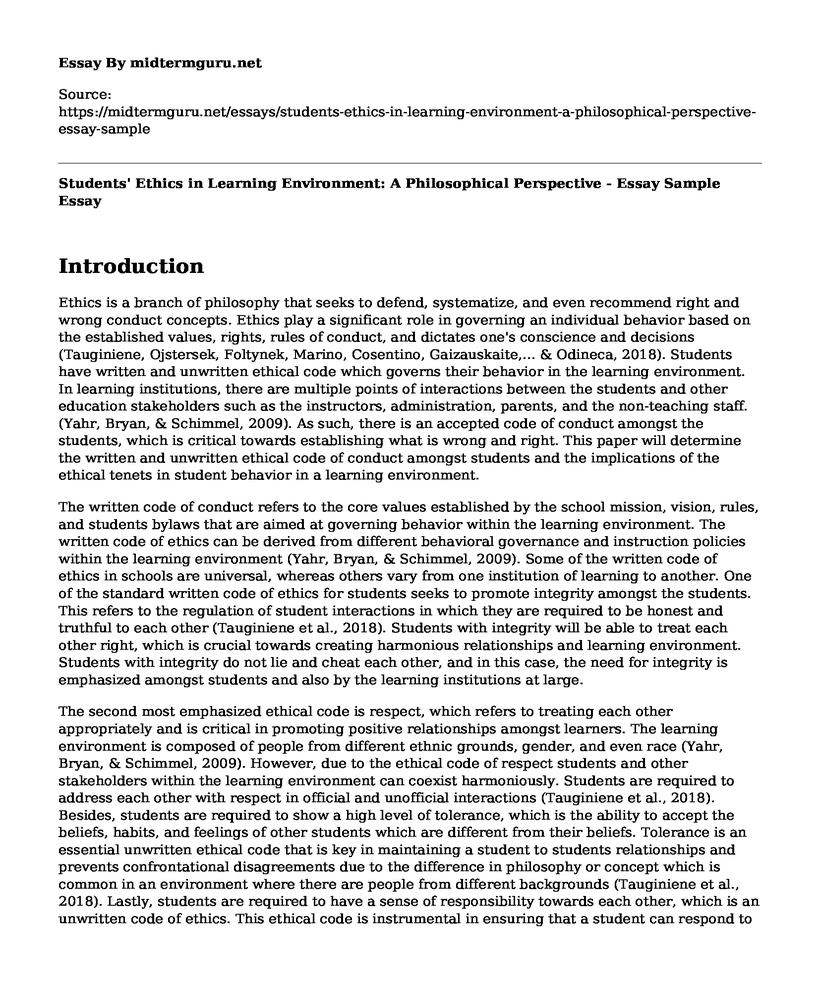Introduction
Ethics is a branch of philosophy that seeks to defend, systematize, and even recommend right and wrong conduct concepts. Ethics play a significant role in governing an individual behavior based on the established values, rights, rules of conduct, and dictates one's conscience and decisions (Tauginiene, Ojstersek, Foltynek, Marino, Cosentino, Gaizauskaite,... & Odineca, 2018). Students have written and unwritten ethical code which governs their behavior in the learning environment. In learning institutions, there are multiple points of interactions between the students and other education stakeholders such as the instructors, administration, parents, and the non-teaching staff. (Yahr, Bryan, & Schimmel, 2009). As such, there is an accepted code of conduct amongst the students, which is critical towards establishing what is wrong and right. This paper will determine the written and unwritten ethical code of conduct amongst students and the implications of the ethical tenets in student behavior in a learning environment.
The written code of conduct refers to the core values established by the school mission, vision, rules, and students bylaws that are aimed at governing behavior within the learning environment. The written code of ethics can be derived from different behavioral governance and instruction policies within the learning environment (Yahr, Bryan, & Schimmel, 2009). Some of the written code of ethics in schools are universal, whereas others vary from one institution of learning to another. One of the standard written code of ethics for students seeks to promote integrity amongst the students. This refers to the regulation of student interactions in which they are required to be honest and truthful to each other (Tauginiene et al., 2018). Students with integrity will be able to treat each other right, which is crucial towards creating harmonious relationships and learning environment. Students with integrity do not lie and cheat each other, and in this case, the need for integrity is emphasized amongst students and also by the learning institutions at large.
The second most emphasized ethical code is respect, which refers to treating each other appropriately and is critical in promoting positive relationships amongst learners. The learning environment is composed of people from different ethnic grounds, gender, and even race (Yahr, Bryan, & Schimmel, 2009). However, due to the ethical code of respect students and other stakeholders within the learning environment can coexist harmoniously. Students are required to address each other with respect in official and unofficial interactions (Tauginiene et al., 2018). Besides, students are required to show a high level of tolerance, which is the ability to accept the beliefs, habits, and feelings of other students which are different from their beliefs. Tolerance is an essential unwritten ethical code that is key in maintaining a student to students relationships and prevents confrontational disagreements due to the difference in philosophy or concept which is common in an environment where there are people from different backgrounds (Tauginiene et al., 2018). Lastly, students are required to have a sense of responsibility towards each other, which is an unwritten code of ethics. This ethical code is instrumental in ensuring that a student can respond to their duties, consequences, and also respond to their actions. This means that a student should not discriminate, steal, or fraud other students.
Conclusion
In conclusion, there are both written and unwritten code of ethics amongst students which are vital in directing their behavior. Correct behavior promotes harmonious student to student relationship and is essential in achieving the set goals of learning. The written ethical code can be derived from the school rules and policies, whereas the students maintain the unwritten code of ethics by themselves, which seeks to promote proper learning.
References
Tauginiene, L., Ojstersek, M., Foltynek, T., Marino, F., Cosentino, M., Gaizauskaite, I., ... & Odineca, T. (2018). General Guidelines for Academic Integrity. Erasmus, 10, 29. Retrieved from http://www.academicintegrity.eu/wp/wp-content/uploads/2018/11/Guidelines_final.pdf
Yahr, M. A., Bryan, L. D., & Schimmel, K. (2009). Perceptions of college and university codes of ethics. Journal of Academic and Business Ethics, 2, 1. Retrieved from https://www.aabri.com/manuscripts/09282.pdf
Cite this page
Students' Ethics in Learning Environment: A Philosophical Perspective - Essay Sample. (2023, Jan 14). Retrieved from https://midtermguru.com/essays/students-ethics-in-learning-environment-a-philosophical-perspective-essay-sample
If you are the original author of this essay and no longer wish to have it published on the midtermguru.com website, please click below to request its removal:
- School of Nursing Scholarship Benefits
- The Problems of the Systems Responsible for Child Wellbeing Essay Example
- Exams as a Measure of Students Abilities - Education Essay Example
- Interview Example: Aging
- Essay on Critical Incidents in the Classroom: Aggressive Behaviors and Outbursts
- Ohio National Guards' Kent State Massacre: Deadly Result - Essay Sample
- Fresh College Grads: Get Real-World Experience With a Job Training Program - Essay Sample







